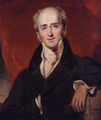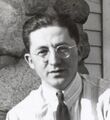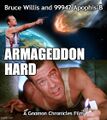Template:Selected anniversaries/March 13: Difference between revisions
No edit summary |
No edit summary |
||
| (30 intermediate revisions by the same user not shown) | |||
| Line 1: | Line 1: | ||
<gallery> | <gallery> | ||
File:Charles Grey, 2nd Earl Grey by Sir Thomas Lawrence copy.jpg|link=Charles Grey, 2nd Earl Grey (nonfiction)|1764: [[Charles Grey, 2nd Earl Grey (nonfiction)|Charles Grey, 2nd Earl Grey]] born. His government will see the abolition of slavery in the British Empire. | File:Charles Grey, 2nd Earl Grey by Sir Thomas Lawrence copy.jpg|link=Charles Grey, 2nd Earl Grey (nonfiction)|1764: [[Charles Grey, 2nd Earl Grey (nonfiction)|Charles Grey, 2nd Earl Grey]] born. His government will see the abolition of slavery in the British Empire. | ||
File:Myrtle_Bachelder_-_1942.jpg|link=Myrtle Bachelder (nonfiction)|1908: Chemist and US military officer [[Myrtle Bachelder (nonfiction)|Myrtle Bachelder]] born. Bachelder will be responsible for the analysis of the spectroscopy of uranium for the [[Manhattan Project (nonfiction)|Manhattan Project]] during the Second World War. After the war, Bachelder will make pioneering contributions to metallochemistry. | |||
File: | |||
|| | File:Melvin Dresher.jpg|link=Melvin Dresher (nonfiction)|1911: Mathematician [[Melvin Dresher (nonfiction)|Melvin Dresher]] (Dreszer) born. Dresher will contribute to game theory, co-developing the game theoretical model of cooperation and conflict known as the Prisoner's dilemma. | ||
||1998 | File:Armageddon Hard.jpg|link=Armageddon Hard|1998: Premiere of '''''[[Armageddon Hard]]''''', an American planetary catastrophe heist film about a New York City detective (Bruce Willis) who must stop a rogue splinter asteroid (99942 Apophis-B) from destroying the earth. | ||
|| | File:Hilary Putnam.jpg|link=Hilary Putnam (nonfiction)|2016: Philosopher, mathematician, and computer scientist [[Hilary Putnam (nonfiction)|Hilary Putnam]] dies. Putnam argued for the reality of mathematical entities, later espousing the view that mathematics is not purely logical, but "quasi-empirical". | ||
|| | ||2017: André Jagendorf botanist and academic dies ... notable for providing direct evidence that chloroplasts synthesize adenosine triphosphate (ATP) using the chemiosmotic mechanism proposed by Peter Mitchell. Pic. | ||
</gallery> | </gallery> | ||
Latest revision as of 08:21, 13 March 2022
1764: Charles Grey, 2nd Earl Grey born. His government will see the abolition of slavery in the British Empire.
1908: Chemist and US military officer Myrtle Bachelder born. Bachelder will be responsible for the analysis of the spectroscopy of uranium for the Manhattan Project during the Second World War. After the war, Bachelder will make pioneering contributions to metallochemistry.
1911: Mathematician Melvin Dresher (Dreszer) born. Dresher will contribute to game theory, co-developing the game theoretical model of cooperation and conflict known as the Prisoner's dilemma.
1998: Premiere of Armageddon Hard, an American planetary catastrophe heist film about a New York City detective (Bruce Willis) who must stop a rogue splinter asteroid (99942 Apophis-B) from destroying the earth.
2016: Philosopher, mathematician, and computer scientist Hilary Putnam dies. Putnam argued for the reality of mathematical entities, later espousing the view that mathematics is not purely logical, but "quasi-empirical".




